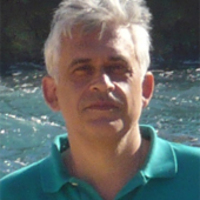Alessandro Giuliani
Istituto Superiore di Sanità, Dipartimento Ambiente e Salute, Department Member
Un libro che raccoglie le opinioni di diversi autori di formazione filosofica. teologica e scientifica sul rapporto tra conoscenza scientifica e verità.
Research Interests:
Breve introduzione alla complessità che parte dal suo (solo apparente) contrario: la semplicità, correttamente intesa non come semplificazione arbitraria ma come ordine emergente.
Research Interests:
The dream of a manmade living creature dates back to the dawn of civilization [1]: the Jewish legend of Golem and the late‐romantic Mary Shelley’s character of Frankenstein’s Monster are just two of the most famous archetypes of synthetic... more
The dream of a manmade living creature dates back to the dawn of civilization [1]: the Jewish legend of Golem and the late‐romantic Mary Shelley’s character of Frankenstein’s Monster are just two of the most famous archetypes of synthetic (human) biology. The passage from myth and metaphor to science and technology has been continuous and, since the eighteenth century mechanic automata up until today, the basic view of synthetic biology research has basically been the same [2].
The emphasis shifted from the eighteenth‐century “organism as a clockwork” metaphor to the nineteenth‐century organism as a “thermal machine,” ending up with the organism as a “computer” of the twentieth and twenty‐first centuries (with a more marked emphasis on network systems in these days with respect to the logical flux of information of the second half of the previous century).
Notwithstanding that, both the fiction and technological ideas edounded
about the idea of the existence of a “basic mechanism of life” that, albeit
complex, could, be replicated in a laboratory (at least in principle).
Thus, it is not without interest to have a closer look at the concept of synthesis.
Not all the projects of artificial life are properly “synthetic.” We do not use
the word synthesis (characterized by the Greek prefix “syn” pointing to the emergence of new features by the organic fusion of different elements) for cars or computer programs. On the other hand, we currently speak of organic synthesis, referring to the production of new organic molecules not present in nature and “synthesizer” is the name given machines devoted to the fusion of different sounds in electronic musical composition.
The emphasis shifted from the eighteenth‐century “organism as a clockwork” metaphor to the nineteenth‐century organism as a “thermal machine,” ending up with the organism as a “computer” of the twentieth and twenty‐first centuries (with a more marked emphasis on network systems in these days with respect to the logical flux of information of the second half of the previous century).
Notwithstanding that, both the fiction and technological ideas edounded
about the idea of the existence of a “basic mechanism of life” that, albeit
complex, could, be replicated in a laboratory (at least in principle).
Thus, it is not without interest to have a closer look at the concept of synthesis.
Not all the projects of artificial life are properly “synthetic.” We do not use
the word synthesis (characterized by the Greek prefix “syn” pointing to the emergence of new features by the organic fusion of different elements) for cars or computer programs. On the other hand, we currently speak of organic synthesis, referring to the production of new organic molecules not present in nature and “synthesizer” is the name given machines devoted to the fusion of different sounds in electronic musical composition.
Research Interests:
Un libro sullo stato della scienza tra artigianato e idolatria
Research Interests:
Il problema dell'interpretazione delle notizie scientifiche che appaiono nei media da parte di chi scienziato non è è qui trattato in una serie di brevi capitoli che cercano di far comprendere il senso profondo dell'agire scientifico e... more
Il problema dell'interpretazione delle notizie scientifiche che appaiono nei media da parte di chi scienziato non è è qui trattato in una serie di brevi capitoli che cercano di far comprendere il senso profondo dell'agire scientifico e così fornire anticorpi per difendersi dalla superstizione scientista.
